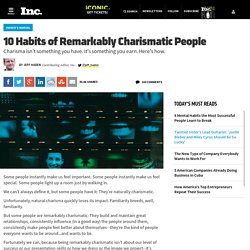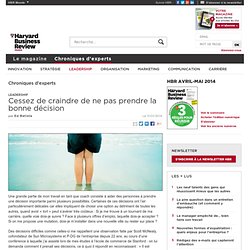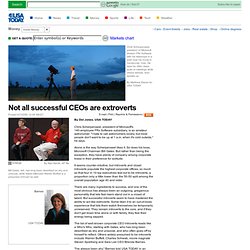

It’s safe to come out as an introvert now. “Raise your hand if you’re an introvert.”

During two different years, I made this request to more than 200 MBA students at Wharton. In 2011, only a few students raised their hands. In 2013, more than a third of the hands shot up. Had we accepted a more introverted cohort of students? No. We had the same number of introverts; students were just more willing to admit it publicly now. Thanks to Susan Cain’s sensational writing, the stigma of introversion is evaporating. However, I’ve noticed that despite growing social and professional acceptance, introverts are still wildly misunderstood. Myth one: “Extraverts get energy from social interaction, whereas introverts get energy from privately reflecting on their thoughts and feelings.” Although many people believe that this description is true, extensive research suggests that it’s false: Introverts spend about the same amount of time with others as extraverts, and enjoy it just as much.
It’s your sensitivity to stimulation. 6 Ways to Prove You're a Genuine Superstar at Work. 8 Things Really Efficient People Do. Five Ways To Be Amazing At Work. 13 things mentally strong people avoid. 5 Things Super Successful People Do Before 8 AM. Networking : get a better job. How to Be More Charismatic: 10 Tips. Some people instantly make us feel important.

Some people instantly make us feel special. Some people light up a room just by walking in. We can't always define it, but some people have it: They're naturally charismatic. Unfortunately, natural charisma quickly loses its impact. Familiarity breeds, well, familiarity. But some people are remarkably charismatic: They build and maintain great relationships, consistently influence (in a good way) the people around them, consistently make people feel better about themselves--they're the kind of people everyone wants to be around...and wants to be. Fortunately we can, because being remarkably charismatic isn't about our level of success or our presentation skills or how we dress or the image we project--it's about what we do.
Here are the 10 habits of remarkably charismatic people: 1. Ask questions. That's all it takes to show the other person they're important. Then when you do speak, don't offer advice unless you're asked. Don't believe me? 2. 3. Cessez de craindre de ne pas prendre la bonne décision. Leadership Le 11/01/2014 Une grande partie de mon travail en tant que coach consiste à aider des personnes à prendre une décision importante parmi plusieurs possibilités.

Certaines de ces décisions ont l’air particulièrement délicates car elles impliquent de choisir une option au détriment de toutes les autres, quand avoir « tort » peut s’avérer très coûteux : Si je me trouve à un tournant de ma carrière, quelle voie dois-je suivre ? Face à plusieurs offres d’emploi, laquelle dois-je accepter ? Si on me propose une mutation, dois-je m’installer dans une nouvelle ville ou rester sur place ? Je paraphrase, mais le souvenir que j’ai de ce commentaire reste vif et son message était limpide. Un autre aspect de cette dynamique est que l’importance que nous attachons à prendre la « bonne » décision peut facilement conduire à la paralysie, car les options qui nous sont proposées sont difficiles à hiérarchiser.
Not all successful CEOs are extroverts. By Del Jones, USA TODAY Chris Scherpenseel, president of Microsoft's 140-employee FRx Software subsidiary, is an amateur astronomer.

"I hate to call astronomers lonely, but most people don't want to be up at 1 a.m. when it's cold outside," he says. Alone is the way Scherpenseel likes it. So does his boss, Microsoft Chairman Bill Gates. But rather than being the exception, they have plenty of company among corporate brass in their preference for solitude.
It seems counter-intuitive, but introverts and closet introverts populate the highest corporate offices, so much so that four in 10 top executives test out to be introverts, a proportion only a little lower than the 50-50 split among the overall population age 40 and older. There are many ingredients to success, and one of the most obvious has always been an outgoing, gregarious personality that lets fast risers stand out in a crowd of talent. Many CEOs rise from marketing and other arenas of extroversion. Typing test.